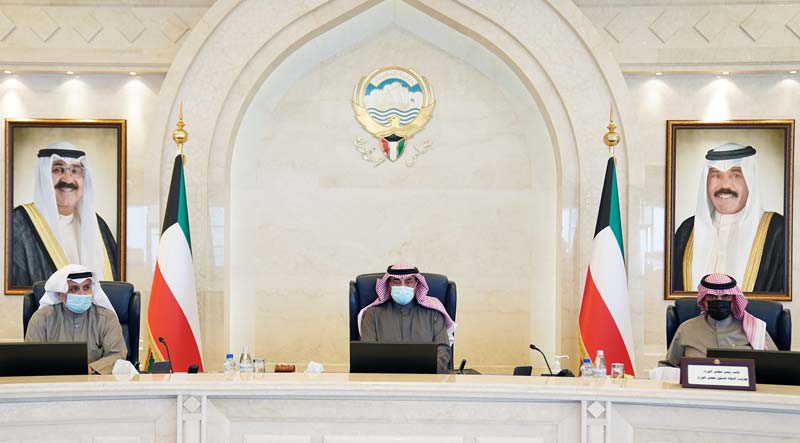 KUWAIT: HH the Prime Minister Sheikh Sabah Al-Khaled Al-Hamad Al-Sabah chairs the Cabinet’s weekly meeting yesterday. – KUNA
KUWAIT: HH the Prime Minister Sheikh Sabah Al-Khaled Al-Hamad Al-Sabah chairs the Cabinet’s weekly meeting yesterday. – KUNAKUWAIT/WASHINGTON: The Cabinet yesterday decided to indefinitely postpone the transition to the second phase of a plan to resume operations of commercial flights at Kuwait International Airport. During its weekly meeting yesterday, the Cabinet also asked the Directorate General of Civil Aviation to reduce the number of commercial flights arriving to the country in coordination with the ministry of health.
The civil aviation authority has reduced arrivals to just 1,000 passengers daily as part of measures to combat a new strain of the coronavirus. Commercial flights were due to be increased in the first week of February, but the Cabinet decided to delay the move based on a recommendation by health authorities.
Border restrictions were being tightened around the world yesterday in the face of an unrelenting coronavirus threat, after a weekend in which anger at social distancing rules bubbled over into fiery clashes in the Netherlands. In the face of deepening fears over new virus strains, US biotech firm Moderna offered some good news from lab studies of coronavirus variants that originated in Britain and South Africa.
"We are encouraged by these new data, which reinforce our confidence that the Moderna COVID-19 vaccine should be protective against these newly detected variants," said CEO Stephane Bancel. However, out of caution, Moderna will carry out more tests adding a second booster of its vaccine - to make three shots in total.
Meanwhile, Mexico's President Andres Manuel Lopez Obrador became the latest public figure to test positive for the disease, and New Zealand reported its first community case for more than two months. In Washington, President Joe Biden was to reimpose a ban yesterday on most non-US citizens who have been in Britain, Brazil, Ireland and much of Europe, as well as adding South Africa to the list, a senior White House official said.
On Sunday, France started demanding a negative PCR test for arrivals by sea and air from European Union neighbors. Sweden said it would prohibit entry from neighboring Norway for three weeks, after cases of the more infectious British strain were detected in Oslo.
But government action to curtail the virus' spread still faces stiff opposition from some citizens. Protests against a coronavirus curfew in the Netherlands degenerated into clashes with police and looting in cities across the country Sunday, a day after a COVID-19 testing center was set on fire in the northern village of Urk. Police used water cannon and dogs in Amsterdam, public television NOS reported, after hundreds gathered to protest the 9 pm-4:30 am curfew, set to last until Feb 10. At least 30 people were arrested in Eindhoven.
A reminder of the vigilance required to keep infections down came from New Zealand, where officials confirmed the first case of COVID-19 in the community for more than two months - in a 56-year-old woman who recently returned from Europe. And in Thailand, the country's largest seafood market, forced to shut after a coronavirus outbreak late last year, got a deep clean yesterday as authorities mulled when to reopen it.
Scientists say the only way out of the pandemic is large-scale vaccinations, but the rollout has stuttered in many places. Australia's medical regulator formally approved the Pfizer vaccine, with the first doses expected to be administered in late February, Prime Minister Scott Morrison said yesterday. On the long-term economic impacts of the pandemic, anti-poverty group Oxfam said the emergency was aggravating inequality. - Agencies









